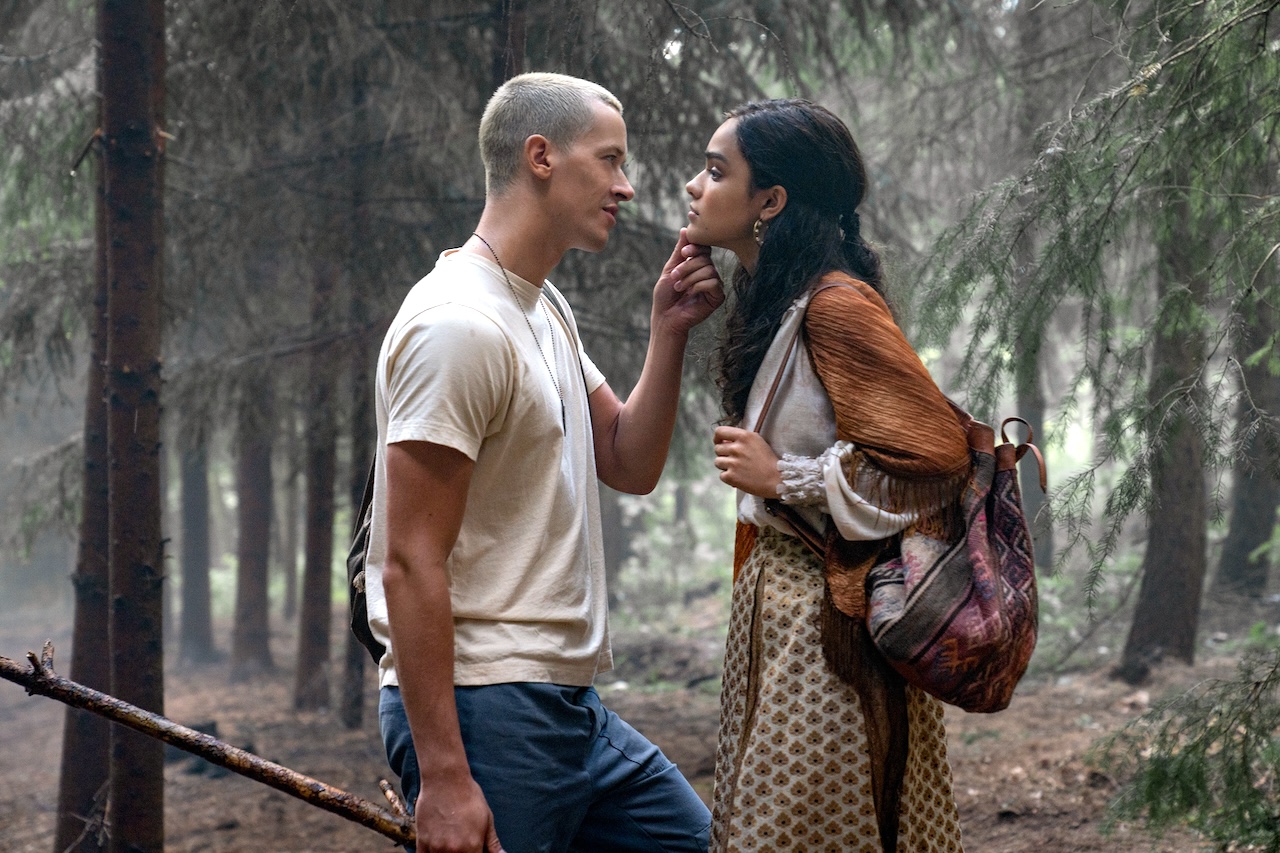- Michael Arndt & Michael Lesslie Discuss Writing The Next Chapter Of The Suzanne Collins Novel Series – The Hunger Games: The Ballad of Songbirds & Snakes (Part 1)
- Michael Arndt & Michael Lesslie Discuss Writing The Next Chapter Of The Suzanne Collins Novel Series – The Hunger Games: The Ballad of Songbirds & Snakes (Part 2)
Extending The Franchise – Interlocking Stories
The first trio The Hunger Games novels – The Hunger Games, Mockingjay, and Catching Fire were written in relatively quick succession from 2008 – 2010. The Ballad Of Songbirds & Snakes was written in 2020 and ironically set 64 years before the first novel. In order to preserve and expand the franchise, there is an element of paying homage to its predecessors and allowing the new instalment to function as a standalone book and movie.
Michael Lesslie considers the philosophical underpinnings of authoritarian regimes as the spinal cord the connects the story vertebrae. There are references to the previous films that forewarn of what’s to come in the story timeline.
“It’s philosophically an investigation of how does this society become the later society we’ve seen, and how does that work on a character level as well? I think that had to be a single journey,” says Lesslie.
The traditional The Hunger Games movie would be 60 pages of buildup, 60 pages of games, and then the movie ends. “Being untethered after 120 pages into new territory, Coriolanus is forged in unknown lands and comes back to reshape the Capital in the image of what he’s learned,” continues Lesslie. Each film needs to be a full and complete story to satisfy the audience.
“As a storyteller, I have a strong bias towards endings. I feel like your movie is about your ending and about where your character ends up as opposed to where they begin in the story,” states Arndt.
“Songbirds has this very sympathetic protagonist and you have this great ending and a reveal that there was a broader plot at work the whole time around the other films. The tricky thing with Songbirds & Snakes was having an anti-heroic ending. Coriolanus falls off the democracy wagon and goes over to the dark side.”
“It feels like a satisfying full arc for a character. That’s the thing you’re always looking for in each individual instalment – how much Katniss has changed from the beginning of Catching Fire to the end of it, or how much Coriolanus has changed from the beginning in Songbirds & Snakes to the end.”
The strength of an ending in terms of how an individual has evolved is more important than whether it’s upbeat or not according to Michael Arndt. Catching Fire was upbeat and The Ballad Of Songbirds & Snakes was downbeat.
The character arcs in Songbirds & Snakes are a little mixed. There is a songbird and a snake in both Lucy and Coriolanus. Lucy ultimately decides to stay in nature and be happy while Corilanus becomes a dictator.
Songbirds & Snakes
Leviathan is a snake – a symbol of chaos and damnation in mythological constructs and song birds often symbolize omens (good and bad), freedom, and purity. Both appear in myths of transition and transformation. It would be easy to create a simple dichotomy and classify Coriolanus as the snake and Lucy as the songbird, but both have elements of each. Michael Lesslie states that there was an earlier version of Lucy that contained even “more snake.”
“There’s a moment in the film that’s not in the book where Lucy murders Tigris (Hunter Schafer) with the poison. Suzanne [Collins] insisted that she wanted to see Lucy kill someone in the Games and not just kill Dill (Luna Steeples) accidentally, because we need to believe that she’s got enough ‘snake’ for Coriolanus to make the turn at the end.”
Paradoxically, Lesslie claims that Lucy embodies the snake more frequently than a songbird in the film. Furthermore, Coriolanus is afraid of snakes and he actively resists them. “At the beginning he’s light and has the plumage of a songbird. By the end of it, the world has taught him that he inevitably has to be a snake in order to survive, whether he wants to or not,” says Arndt.
The Nature Of Love
The dance between Coriolanus and Lucy depicts a mutual admiration of sorts, but is it love? The Hunger Games engine is driven by the law of the jungle – survive or perish. It is equally driven by compassion and trust for your fellow human.

Tigris Snow (Hunter Schafer) Photo by Murray Close
“It’s very explicit in the scene where they go to the lake and Lucy says, ‘Trust is the most important thing to me. I couldn’t love someone if I didn’t trust them.’ And the key turning point for the whole relationship is when she says, ‘Well, I killed three people. That’s enough. And Coriolanus says, ‘Who is the third one? And that’s the first time she gets the sense that he’s real,” says Arndt. “She doesn’t quite trust him. But I do feel like the whole universe is built so much on sheer violence, coercion, paranoia, that it stamps out the possibility of love.”
“The tragedy of the situation is that they live in this society. Lucy Gray says, ‘I wish we could have met in some other circumstance. I wish you had come to show and then we could have gone out and had drinks together.”
“They’ve gone through this fire and come out the other side as slightly more mature, broken human beings,” adds Lesslie.
“I love the way Francis Lawrence directs the scene in the meadow where they are separate from one another and gradually come closer and closer. It’s only then that they can achieve like actual intimacy and connection. And then it all comes crashing down, because those old agendas seep in.”
“I think there is the potential for true love in there. I think that’s the tragedy of it that Coriolanus almost loses the capacity for love by the end because he loses the capacity for trust,” says Arndt.
Writing Approach
“My scripts tend to be about family or finding your family,” states Michael Arndt. “Little Miss Sunshine starts out with all these these characters and their obsessive, individualist pursuits. It’s about them coming together as a family. Toy Story 3 has that notion that as long as we stay together, we’re family, we’re going to be okay.”
“I like characters who are very passionate, want big things, and have big dreams, but also suffer great disappointments because of that. I tend to come back to the consolation of the small family, the pleasures and the luxury that a family will give to you.” He sees these elements of family in Ballad Of Songbirds & Snakes.
Michael Lesslie has a different approach to his writing. “One thing I have noticed in my scripts is when I write action, it tends to be blow by blow and I can’t abbreviate it. I have to be in the moment of the film, in every second of the film that I’m writing.”
“I tend to be drawn towards finding those heightened dramatic situations like in Songbirds and then asking, ‘What is it really going on inside this character’s head in that moment?” I’m drawn reality within very heightened situations.”
Curiously, Michael Lesslie was told he’s great at writing love stories. “I looked back and realized that in each of my scripts that had gone well, there was actually a love story at the heart of it. And it doesn’t have to be consummated happily. People are negotiating a romantic bond.”
Career Advice
“We’re about to be hit by the title wave of AI-generated filmmaking,” declares Michael Arndt. “I feel like it’s both a crisis and an opportunity. Anybody with a computer is going to be able to make a Star Wars movie for little cost.” The most important things about filmmaking will become the writing and good acting.
“We’re going to see this explosion of AI-generated images. But what they still lack is, the most difficult part, which is the story. When I was at Pixar, it took four years to make Toy Story 3. Three of those years were spent writing the screenplay. There’s no substitute for a story well told.”
“Obviously, you want to find your distinctive voice. You don’t want to imitate other people. I think there’s a value to audacity and outrageousness to counter those earnest, polite little dramas. Something that’s going to challenge and risk something to the audience.”
“I think that people love spectacle, but the thing that makes you want to go back and rewatch a movie is the emotional connection that you have. If you can have a strong emotional ending at the end, if you can pull your audience through the first and second acts, and then have a really strong path of the third act, you’re fine.
- Don’t be too polite
- Don’t be too safe
- There’s a value to audacity
- There’s a value to doing something people have never done before
- There’s a value to taking a risk
- Write movies that are out there a little bit and that are challenging about the way we live in the world right now”
“I think it’s about making sure you can create something that feels as surprising and true as possible,” adds Michael Lesslie. “I don’t think that AI is going to be able to write stuff that’s really weird and idiosyncratic because it’s basically a plagiarism machine. But it’s actually a great spur to originality to tell the story that AI would never have thought of in a million years.”
[More: Nina Jacobson On “The Hunger Games: The Ballad Of Songbirds & Snakes”]
